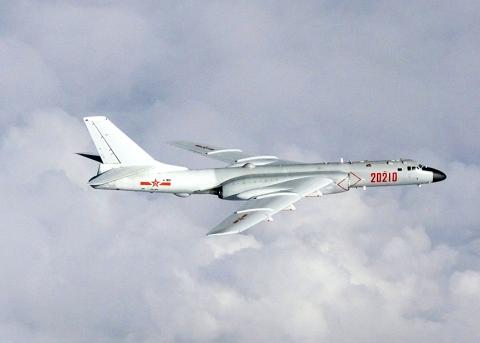China is destabilizing the Indo-Pacific region, US Secretary of Defense Mark Esper said yesterday, accusing Beijing of predatory economics, intellectual property theft and “weaponizing the global commons.”
The comments by Esper on his first overseas trip as secretary threaten to inflame already heightened tensions between Washington and Beijing as they are locked in an escalating trade dispute.
China’s increasing assertiveness, especially in the energy-rich South China Sea, has raised concerns within the region and the US is challenging Chinese maritime hegemony and seeking stronger ties with nations pushing back against Beijing.

Photo: EPA-EFE / Japanese Defense Ministry
“We firmly believe no one nation can or should dominate the Indo-Pacific and we are working alongside our allies and partners to address the region’s pressing security needs, Esper told reporters in Sydney.
“We also stand firmly against a disturbing pattern of aggressive behavior, destabilizing behavior from China. This includes weaponizing the global commons, using predatory economics and debt for sovereignty deals, and promoting state-sponsored theft of other nations’ intellectual property,” he said.
China has unnerved the region and angered the US by installing military equipment and other facilities on artificial islands it has built in the disputed South China Sea.
China claims large parts of the South China Sea through which about US$3.4 trillion in shipping passes each year.
Countries including Taiwan, Malaysia, the Philippines and Vietnam contest the territorial claims.
US Secretary of State Mike Pompeo on Friday decried “decades of bad behavior” from China that have hampered free trade, laying out a case at a Southeast Asian forum in Bangkok for Washington’s trade spat with Beijing.
US President Donald Trump on Thursday slapped 10 percent tariffs on US$300 billion in Chinese imports, stunning financial markets and ending a month-long trade truce.
China on Friday vowed to fight back.
Esper and Pompeo yesterday met with their Australian counterparts in Sydney at an annual security forum where the US and Australia pledged to strengthen opposition to Chinese activities in the Pacific.
The US and its Western allies worry that China is using foreign aid to secure greater influence over small Pacific countries, which control vast swathes of resource-rich ocean.
Australia, traditionally the major power in the South Pacific, has promised up to A$3 billion (US$2.04 billion) in grants and cheap loans to counter what Washington describes as China’s “payday loan diplomacy.”
“Cooperation with us and our Australian friends bring mutual benefits, not zeros, deals where one side wins and other risks losing,” said Pompeo in a thinly veiled criticism of China’s aid.

MAKING WAVES: China’s maritime militia could become a nontraditional threat in war, clogging up shipping lanes to prevent US or Japanese intervention, a report said About 1,900 Chinese ships flying flags of convenience and fishing vessels that participated in China’s military exercises around Taiwan last month and in January last year have been listed for monitoring, Coast Guard Administration (CGA) Deputy Director-General Hsieh Ching-chin (謝慶欽) said yesterday. Following amendments to the Commercial Port Act (商港法) and the Law of Ships (船舶法) last month, the CGA can designate possible berthing areas or deny ports of call for vessels suspected of loitering around areas where undersea cables can be accessed, Oceans Affairs Council Minister Kuan Bi-ling (管碧玲) said. The list of suspected ships, originally 300, had risen to about

DAREDEVIL: Honnold said it had always been a dream of his to climb Taipei 101, while a Netflix producer said the skyscraper was ‘a real icon of this country’ US climber Alex Honnold yesterday took on Taiwan’s tallest building, becoming the first person to scale Taipei 101 without a rope, harness or safety net. Hundreds of spectators gathered at the base of the 101-story skyscraper to watch Honnold, 40, embark on his daredevil feat, which was also broadcast live on Netflix. Dressed in a red T-shirt and yellow custom-made climbing shoes, Honnold swiftly moved up the southeast face of the glass and steel building. At one point, he stepped onto a platform midway up to wave down at fans and onlookers who were taking photos. People watching from inside

Japan’s strategic alliance with the US would collapse if Tokyo were to turn away from a conflict in Taiwan, Japanese Prime Minister Sanae Takaichi said yesterday, but distanced herself from previous comments that suggested a possible military response in such an event. Takaichi expressed her latest views on a nationally broadcast TV program late on Monday, where an opposition party leader criticized her for igniting tensions with China with the earlier remarks. Ties between Japan and China have sunk to the worst level in years after Takaichi said in November that a hypothetical Chinese attack on Taiwan could bring about a Japanese

The WHO ignored early COVID-19 warnings from Taiwan, US Deputy Secretary of Health and Human Services Jim O’Neill said on Friday, as part of justification for Washington withdrawing from the global health body. US Secretary of State Marco Rubio on Thursday said that the US was pulling out of the UN agency, as it failed to fulfill its responsibilities during the COVID-19 pandemic. The WHO “ignored early COVID warnings from Taiwan in 2019 by pretending Taiwan did not exist, O’Neill wrote on X on Friday, Taiwan time. “It ignored rigorous science and promoted lockdowns.” The US will “continue international coordination on infectious